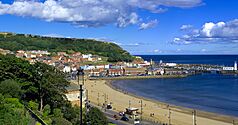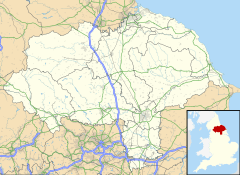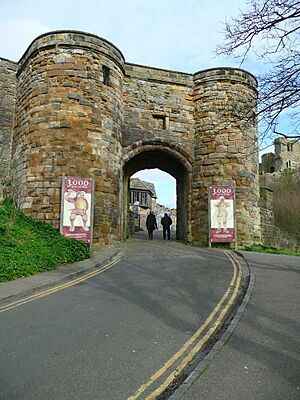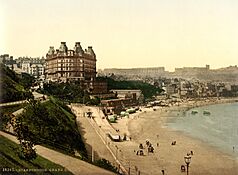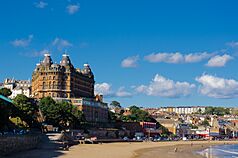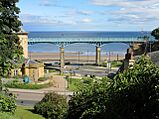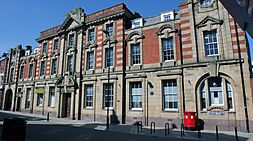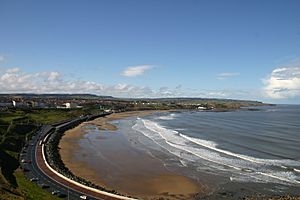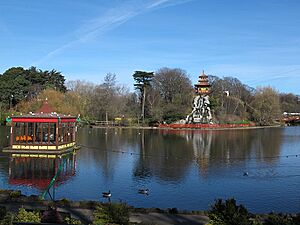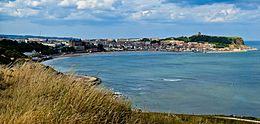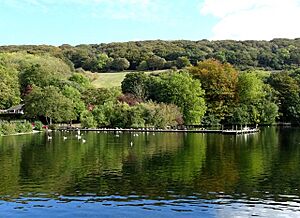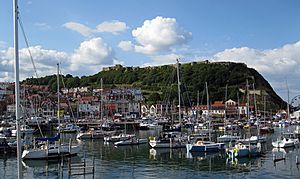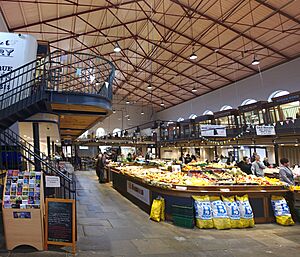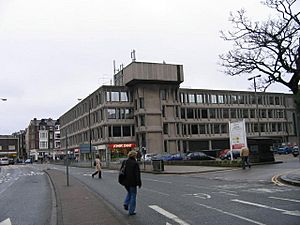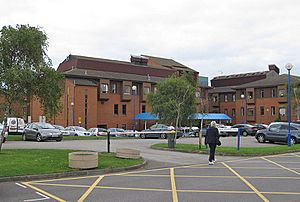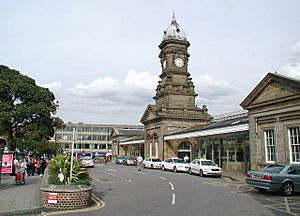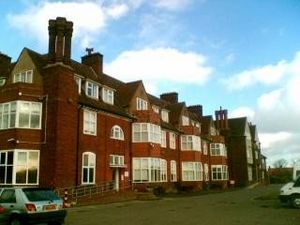Scarborough, North Yorkshire facts for kids
Quick facts for kids Scarborough |
|
|---|---|
| Town | |
|
South Bay, the Grand Hotel, The Spa's Suncourt Enclosure, Old Toll House and Market Hall |
|
| Population | 61,749 (2011 census) |
| Demonym | Scarborian |
| OS grid reference | TA040880 |
| • London | 190 mi (310 km) S |
| Unitary authority |
|
| Ceremonial county | |
| Region | |
| Country | England |
| Sovereign state | United Kingdom |
| Post town | SCARBOROUGH |
| Postcode district | YO11 – YO13 |
| Dialling code | 01723 |
| Police | North Yorkshire |
| Fire | North Yorkshire |
| Ambulance | Yorkshire |
| EU Parliament | Yorkshire and the Humber |
| UK Parliament |
|
Scarborough is a cool seaside town in North Yorkshire, England. It's the biggest town on the Yorkshire Coast with about 61,749 people living there. Scarborough sits right on the North Sea coastline.
The town has a long history, starting as a fishing port. Today, it's famous for tourism and has a growing digital and creative industry. People who live here are called Scarborians.
Contents
What's in a Name?
Scarborough was started by Vikings in the 900s. A Viking raider named Thorgil, also known as Skarthi (which means 'hare-lip'), built a fort here. That's how the town got its name: 'Skarthi's burh' (meaning Skarthi's fort).
A Look Back in Time
Early Days
People believe Scarborough was founded around 966 AD by a Viking named Thorgils Skarthi. While there's no old evidence left today (maybe because the coast has changed over time), we know people lived here much earlier. There were settlements during the Stone Age and Bronze Age. The Romans even had a signal station on Scarborough headland in the 300s AD to watch for sea invaders.
Roman Times
The Romans built a signal station on the cliffs overlooking the North Sea. It was part of a chain of stations used to warn about raiders coming from the sea. They used it from about 370 AD until the early 400s.
In 2021, something amazing was found in Eastfield, Scarborough: a huge Roman building! It might have been a fancy villa, a religious place, or both. This building is unique in Britain and is as big as two tennis courts. It even had a bathhouse and a round tower. Experts say it was designed by the best architects in northern Europe at the time. This discovery is one of the most important Roman finds in the last ten years!
Medieval Period
Scarborough grew again under King Henry II. He built a stone castle on the headland and gave the town special rights in 1155 and 1163. These rights allowed a market to be held and let the town be ruled by its citizens.
A famous event from this time was the Scarborough Fair. This was a huge trading festival that lasted six weeks, from August 15th to September 29th. Merchants from all over Europe came to trade here! The fair happened for 500 years and is even remembered in the famous song Scarborough Fair:
- Are you going to Scarborough Fair?
- —parsley, sage, rosemary and thyme...
Becoming a Resort
During the English Civil War in the 1640s, Scarborough and its castle were fought over many times. The town was left mostly in ruins after the war.
But then, in 1626, a woman named Mrs. Thomasin Farrer found a stream of special water coming from the cliffs. This led to the creation of Scarborough Spa. A book about the spa waters in 1660 made the town very popular, and people started visiting to "take the waters" for their health. Scarborough became Britain's first seaside resort!
When the railway arrived in 1845, even more visitors came to Scarborough. The Scarborough railway station even has a record for the world's longest platform seat!
Wartime and Fishing Tales
During the First World War, German warships attacked the town in 1914. This was a big shock to the British people. The Scarborough Pier Lighthouse was damaged. Later, in 1916 and 1917, German submarines also attacked, sinking fishing boats and causing some deaths.
In the 1930s, Scarborough became famous for big-game tuna fishing. People caught huge tuna, some weighing over 800 pounds! A club called the British Tunny Club was even started here.
On June 5, 1993, a big landslip happened, causing part of the Holbeck Hall Hotel and its gardens to fall into the sea. You can still see where the cliff collapsed from The Esplanade.
Cool Places to See
Scarborough has many interesting buildings. The St Martin-on-the-Hill church, built in 1862–63, has beautiful artworks by famous artists like William Morris. The Crown Spa Hotel was Scarborough's first hotel built just for guests.
You can also see old Georgian buildings like the Rotunda Museum and the Cliff Bridge. Victorian buildings include the Town Hall, Scarborough Spa, and the Art Gallery. The older parts of town have small, orange-roofed buildings, while newer areas have bigger, grander buildings from when Scarborough became a popular resort.
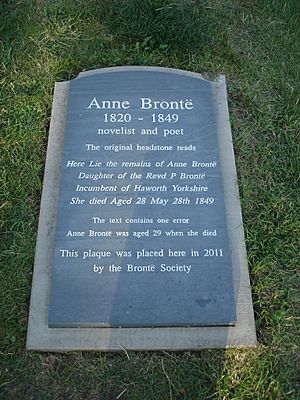
A very famous landmark is the Grand Hotel on St Nicholas Cliff. When it opened in 1867, it was the biggest hotel and brick building in Europe! It's designed around the idea of time: four towers for the seasons, 12 floors for the months, 52 chimneys for the weeks, and originally 365 bedrooms for the days of the year. The novelist Anne Brontë (who wrote The Tenant of Wildfell Hall) died here in 1849 and is buried in the nearby St Mary's Church graveyard.
Modern buildings include the Stephen Joseph Theatre and the Brunswick Shopping Centre.
Exploring Scarborough's Bays
The town's most striking feature is the high, rocky headland that sticks out into the North Sea, with Scarborough Castle on top. This headland divides the seafront into two main areas: the North Bay and the South Bay. Both bays have sandy beaches and lots of rock pools when the tide is out.
North Bay Fun
The North Bay is usually the quieter part of the resort. It's home to Peasholm Park, which has a Japanese theme with a pagoda and a new boat house. In summer, you can watch a fun mock sea battle (like the Battle of the River Plate) on the boating lake, complete with model boats and fireworks!
Northstead Manor Gardens has the North Bay Railway and other attractions. The water chute here is one of Britain's oldest, still working the same way it did in the 1930s. The North Bay Railway is a small train that runs from Peasholm Park to the Sea Life Centre at Scalby Mills. One of its trains, Neptune, built in 1931, is thought to be the oldest working diesel-hydraulic train in the world!
South Bay Excitement
The South Bay is where the old town and harbour are. It's the main tourist area, full of sandy beaches, cafes, arcades, and entertainment. The harbour has been updated with new walkways and lighting.
The South Cliff Promenade, above the Spa, offers amazing views of the South Bay and the old town. You can see beautiful old buildings here. The South Bay also has the UK's largest illuminated 'star disk', which is 85 feet across and lights up to show 42 bright stars and constellations.
Mere and Mount
To the south-west of town is a pretty lake called Scarborough Mere. It's now part of the Oliver's Mount Country Park, a nice place for picnics, fishing, and walks.
Weather in Scarborough
Scarborough has a mild climate. Summers are gentle, and winters are cool and windy. The warmest months are July and August, with temperatures around 17°C during the day. In January, daytime temperatures are about 4°C.
| Climate data for Scarborough, North Yorkshire: Average maximum and minimum temperatures, and average rainfall recorded between 1991 and 2020 by the Met Office. |
|||||||||||||
|---|---|---|---|---|---|---|---|---|---|---|---|---|---|
| Month | Jan | Feb | Mar | Apr | May | Jun | Jul | Aug | Sep | Oct | Nov | Dec | Year |
| Mean daily maximum °C (°F) | 6.7 (44.1) |
7.1 (44.8) |
9.1 (48.4) |
11.4 (52.5) |
14.0 (57.2) |
16.9 (62.4) |
19.2 (66.6) |
19.1 (66.4) |
16.7 (62.1) |
13.1 (55.6) |
9.5 (49.1) |
7.0 (44.6) |
12.5 (54.5) |
| Mean daily minimum °C (°F) | 2.0 (35.6) |
2.0 (35.6) |
3.1 (37.6) |
5.0 (41.0) |
7.4 (45.3) |
10.1 (50.2) |
12.2 (54.0) |
12.4 (54.3) |
10.5 (50.9) |
7.9 (46.2) |
4.6 (40.3) |
2.4 (36.3) |
6.66 (43.99) |
| Average precipitation mm (inches) | 56.9 (2.24) |
48.8 (1.92) |
45.5 (1.79) |
50.4 (1.98) |
45.2 (1.78) |
65.5 (2.58) |
56.6 (2.23) |
69.5 (2.74) |
57.3 (2.26) |
68.4 (2.69) |
73.4 (2.89) |
68.0 (2.68) |
705.5 (27.78) |
| Average precipitation days (≥ 1.0 mm) | 12.1 | 11.5 | 9.5 | 9.1 | 8.3 | 9.9 | 10.0 | 10.2 | 9.4 | 11.6 | 13.0 | 12.8 | 127.3 |
| Mean monthly sunshine hours | 56.3 | 83.5 | 117.9 | 164.8 | 213.8 | 189.3 | 201.3 | 188.5 | 142.5 | 101.9 | 64.9 | 54.2 | 1,578.8 |
| Source: Met Office | |||||||||||||
How Scarborough Makes a Living
Scarborough's fishing industry is still active, though smaller than it used to be. You can buy fresh, local seafood at the fish market in the harbour. There's even a seaweed farm that started in 2018!
Tourism is a huge part of Scarborough's economy. It's the second most visited place in England for British holidaymakers! The beaches and attractions are super busy in summer.
The town centre has many shops, including a pedestrianised shopping street and the Brunswick Shopping Centre. There's also an indoor market hall with antique shops and independent traders.
Local Businesses
Scarborough is home to some cool companies. Plaxton has been building coaches and buses here since 1907. McCain Foods has had a factory in the town for over 50 years.
Creative Side
Scarborough is known for its creative industries, like art, design, and digital work. In 2008, Scarborough won the title of Britain's Most Enterprising Town! It even won a European award in 2009.
Healthcare
Scarborough Hospital is the local hospital and the biggest employer in the area, with over 2,400 staff. A new £47 million Emergency Department is being built and should open in early 2024.
Getting Around Scarborough
Roads
Scarborough has four main roads connecting it to other towns and cities:
- The A64 goes to Leeds (through York). It's the main road for tourists coming to town.
- The A165 goes south along the coast to Hull.
- The A170 heads west to Pickering.
- The A171 goes north along the coast through Whitby and into the North York Moors.
Buses
Scarborough has many bus routes that connect the town centre to its suburbs and nearby towns like Bridlington, Whitby, and York. There are also two Park and Ride services, where you can park your car and take a bus into town. In summer, open-top Beachcomber buses run along the seafront, linking the North and South bays.
Trains
Scarborough railway station is the end of the York-Scarborough line. You can catch trains to York, Leeds, Manchester Piccadilly, and Hull. The station is famous for having the longest station seat in the world, at 152 yards (139 m) long!
Funiculars
Scarborough has two working funicular railways (also known as cliff lifts) on the South Bay. These are fun ways to get up and down the steep cliffs!
Culture and Fun
Media
Scarborough has local radio stations like BBC Radio York and Coast & County Radio. The Scarborough News is the weekly newspaper for the town.
Live Theatre
The famous writer Alan Ayckbourn has lived in Scarborough for many years. He has written many plays that are first performed at the Stephen Joseph Theatre in town.
The Open Air Theatre is a huge outdoor venue that can seat 8,000 people! It was opened in 1932 and now hosts concerts by many British and international music acts.
Movies and Art
As of 2019[update], Scarborough has two cinemas: the Hollywood Plaza and the Stephen Joseph Theatre.

The Rotunda Museum is a national centre for geology. The Scarborough Art Gallery has collections of fine arts. Scarborough also has a cool graffiti culture, with legal areas for artists to create murals.
Music Scene
The Scarborough Spa complex is home to the Scarborough Spa Orchestra, which is the last seaside orchestra in the UK!
Famous pop singer Robert Palmer spent his teenage years in Scarborough. The band Little Angels was also from Scarborough and had a number one album in 1993.
Acoustic Gathering is a free music festival held every September in Peasholm Park. It features many bands and singers from across the UK.
Filming Location
Scarborough has been a filming location for many movies and TV shows! Films like Little Voice and Possession were filmed here. TV series like Heartbeat and The Royal also filmed scenes in the area. A sitcom called Scarborough was filmed in the town in 2019.
Exciting Events
- Sci-Fi Scarborough – Since 2014, this "Unconventional Convention" has been held at The Spa. It's a mix of Sci-Fi, Comicon, and gaming fun!
- Seafest – This annual festival in July celebrates the region's fishing history. It has lots of folk singers, musicians, and even a 'Sea Fish Cookery' tent where chefs show how to prepare seafood.
- Heroes Welcome UK – This movement started in Scarborough to show support for members of the armed forces. Businesses display a special sticker to welcome service personnel.
- Armed Forces Day – Scarborough has hosted this event every June since 2009. It includes displays of army vehicles, air shows, and a parade. In 2022, Scarborough hosted the national Armed Forces Day event!
- Tour de Yorkshire – Scarborough is the only town to have hosted a start or finish event in every edition of the Tour de Yorkshire cycling race.
- Scarborough Cricket Festival – An annual cricket festival held at North Marine Road.
Education
Scarborough has several secondary schools, including Graham School, George Pindar School, Scalby School, and St Augustine's Catholic School. There's also a private school, Scarborough College, which offers the International Baccalaureate.
Coventry University Scarborough Campus opened in 2015 and moved to a new purpose-built site in 2016. It aims to have 3000 students! Scarborough Sixth Form College and Yorkshire Coast College also provide further education.
Sports and Activities
Scarborough has a long history with sports!
The Scarborough Amateur Rowing Club was founded in 1869 and is the oldest rowing club on the north-east coast. They compete in sea rowing races throughout the summer.
Scarborough is home to the Oliver's Mount racing circuit. This track uses public roads and has hosted motorcycle and rallying events for many years. Famous motorcycle racers like Barry Sheene have raced here.
Scarborough Cricket Club has won the national club cricket championship five times! They also host the annual Scarborough Cricket Festival, where Yorkshire plays some of its home games.
The former Scarborough Football Club played in the Football League in the 1990s. They won the FA Trophy three times! A new club, Scarborough Athletic, was formed in 2007 and plays at the Flamingo Land Stadium.
Scarborough also has a Hockey Club, Rugby Union Football Club, and a Gymnastics Academy. The town has two main golf courses, North Cliff and South Cliff.
In recent years, Scarborough has become a popular spot for cold water surfing, with surf shops and competitions.
Famous People from Scarborough
- Zoe Aldcroft (born 1996), a rugby player for the England women's team, named World Player of the Year in 2021.
- Sir Alan Ayckbourn (born 1939), a famous playwright.
- Anne Brontë (1820–1849), the novelist and poet, died and is buried here.
- Richard Dunn (born 1943), a boxer who was British, European & Commonwealth Heavyweight Champion.
- Sir Edward James Harland, 1st Baronet (1831–1895), who helped start the famous shipbuilding company Harland and Wolff.
- Susan Hill (born 1942), a novelist.
- Paul Ingle (born 1972), a former boxing champion.
- Sir Ben Kingsley (born 1943), an Oscar-winning actor.
- Charles Laughton (1899–1962), a famous actor and director.
- James Paul Moody (1887–1912), the sixth officer on the RMS Titanic.
- Bill Nicholson (1919–2004), a famous footballer and manager.
- Robert Palmer (1949–2003), the globally successful pop/soul singer, went to school in Scarborough.
- William Smith, known as "The Father of English Geology," lived in Scarborough.
- Dame Penelope Wilton (born 1946), an actress.
See also
 In Spanish: Scarborough para niños
In Spanish: Scarborough para niños


